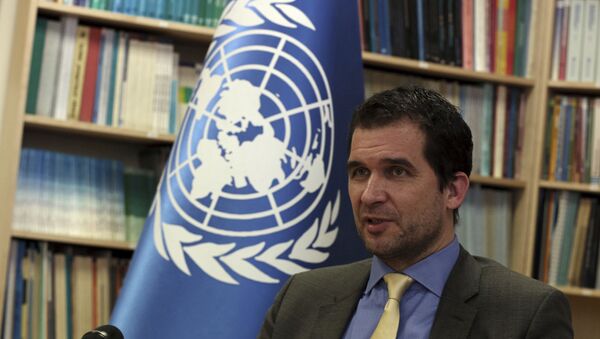United Nations Special Rapporteur Nils Melzer stated that working on Julian Assange’s case has made him scared to learn more about "our democracies". In a Twitter post timed to the anniversary of his meeting with the WikiLeaks founder, Melzer said it’s not an accident that that the whistleblower has been treated inhumanely.
Melzer, who previously worked 12 years at the Red Cross and is a professor of international law at the University of Glasgow, has been working on the Assange case and parsing the accusations made against the activist for several years.
Today one year ago we visited #Assange in prison.
— Nils Melzer (@NilsMelzer) May 9, 2020
He showed clear signs of prolonged psychological #Torture.
First I was shocked that mature democracies could produce such an accident.
Then I found out it was no accident.
Now, I am scared to find out about our democracies... pic.twitter.com/enElUmA1fK
The accusations of sexual assault against the Australian were made in 2010, the year WikiLeaks published classified US documents detailing possible war crimes committed by US forces during the military campaign in Afghanistan and the Iraq War. In particular, the leaked papers reveal murder, the torture of civilians and other human rights abuses. Assange dismissed the accusations against him as a pretext to extradite him to the United States where he is accused of violating the Espionage Act.
After conducting his own investigation, Melzer said the Swedish probe against Assange was an abuse of process and described US accusations against the online publisher as the criminalization of investigative journalism. After meeting the Wikileaks founder in prison, Melzer accused UK authorities of torturing Assange, a claim they denied.
"In 20 years of work with victims of war, violence and political persecution I have never seen a group of democratic States ganging up to deliberately isolate, demonize and abuse a single individual for such a long time and with so little regard for human dignity and the rule of law", Melzer said.
"The collective persecution of Julian Assange must end here and now!", he added.
On 12 April 2019 Assange was dragged by UK police from the Ecuadorian embassy in London, where he had lived for seven years as an asylum seeker fearing political persecution. Commenting on Ecuador's decision to terminate Assange's asylum, President Lenin Moreno remarked that Quito had "reached its limit on the behavior of" the WikiLeaks founder. The incident occurred a day after the whistleblowing website reported that Ecuadorian authorities were spying on Assange. The Australian was subsequently arrested and is now in prison on charges of violating bail.




